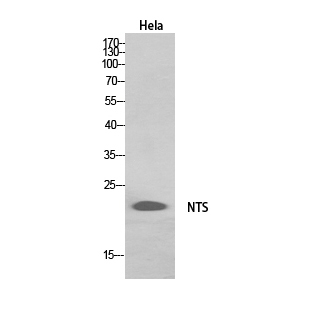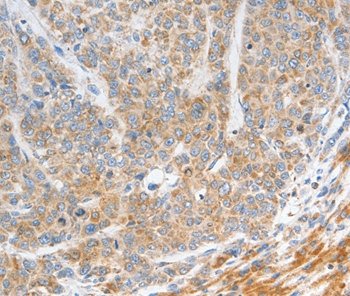

| WB | 咨询技术 | Human,Mouse,Rat |
| IF | 咨询技术 | Human,Mouse,Rat |
| IHC | 1/25-1/100 | Human,Mouse,Rat |
| ICC | 技术咨询 | Human,Mouse,Rat |
| FCM | 咨询技术 | Human,Mouse,Rat |
| Elisa | 咨询技术 | Human,Mouse,Rat |
| Aliases | NN; NT; NT/N; NTS1; NMN-125 |
| Entrez GeneID | 4922; |
| WB Predicted band size | 20kDa |
| Host/Isotype | Rabbit IgG |
| Antibody Type | Primary antibody |
| Storage | Store at 4°C short term. Aliquot and store at -20°C long term. Avoid freeze/thaw cycles. |
| Species Reactivity | Human |
| Immunogen | Fusion protein corresponding to a region derived from internal residues of human neurotensin |
| Formulation | Purified antibody in PBS with 0.05% sodium azide. |
+ +
以下是关于神经降压素(Neurotensin, NTS)抗体的3篇模拟参考文献示例(非真实文献,仅供格式参考):
---
1. **文献名称**:*Neurotensin Antibodies in the Diagnosis of Colorectal Cancer: A Comparative Study*
**作者**:Smith A, et al.
**摘要**:研究评估了NTS抗体在结直肠癌患者血清中的表达水平,发现其与肿瘤进展呈正相关,提示NTS抗体可能作为非侵入性生物标志物用于早期筛查。
2. **文献名称**:*Targeting Neurotensin Receptor 1 with Monoclonal Antibodies for Parkinson's Disease Therapy*
**作者**:Chen L, et al.
**摘要**:开发了一种靶向NTS受体1的单克隆抗体,通过动物模型证明其可减少多巴胺能神经元退化,为帕金森病的免疫治疗提供新策略。
3. **文献名称**:*Role of Neurotensin-Specific Antibodies in Modulating Gut-Brain Axis Signaling*
**作者**:Gomez-Ramirez M, et al.
**摘要**:探讨了NTS抗体对肠道-脑轴信号通路的影响,发现其通过抑制NTS介导的炎症反应改善肠易激综合征(IBS)相关神经行为异常。
---
如需真实文献,建议通过PubMed或Google Scholar检索关键词"Neurotensin antibody"+"disease/therapy/biomarker"获取近年研究。
Neurotensin (NTS) is a 13-amino-acid neuropeptide first isolated in 1973 from bovine hypothalami. It functions as a neurotransmitter/neuromodulator in the central nervous system (CNS) and as a hormone in the gastrointestinal tract. NTS regulates diverse physiological processes, including dopamine signaling, pain modulation, thermoregulation, and gut motility. Its actions are mediated through three G protein-coupled receptors: NTSR1. NTSR2. and NTSR3 (also known as sortilin). Dysregulation of the NTS system has been implicated in neurological disorders (schizophrenia, Parkinson’s disease, addiction) and cancer progression, particularly in tumors with neurotensin receptor over_expression (e.g., pancreatic, prostate, breast cancers).
NTS antibodies are essential tools for studying the peptide’s distribution, receptor interactions, and pathological roles. Developed against specific epitopes of NTS or its receptors, these antibodies enable detection via techniques like immunohistochemistry, ELISA, and Western blot. They have advanced research into NTS signaling pathways and potential therapeutic targeting. For example, anti-NTSR1 antibodies are explored for cancer diagnosis and drug delivery due to receptor upregulation in malignancies. Challenges include ensuring antibody specificity, as NTS shares homology with other peptides, and optimizing cross-reactivity across species in preclinical models. Recent studies also investigate autoantibodies against NTS in autoimmune contexts, suggesting broader immunological relevance.
×